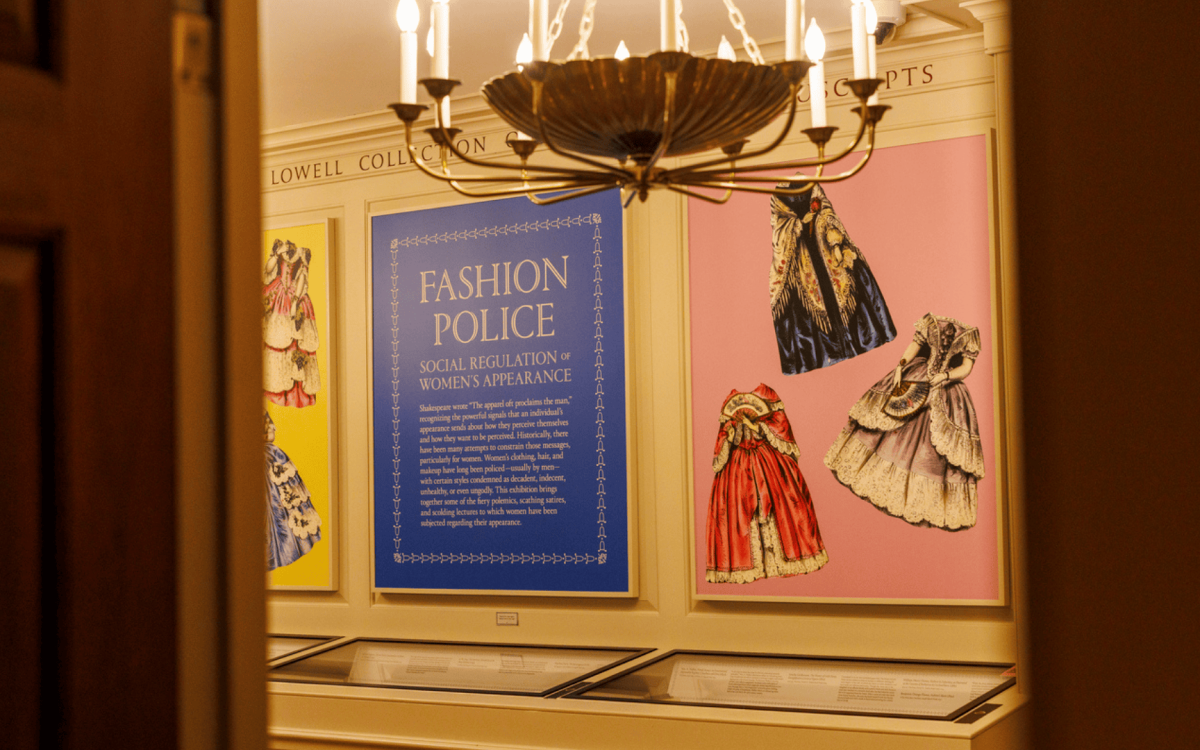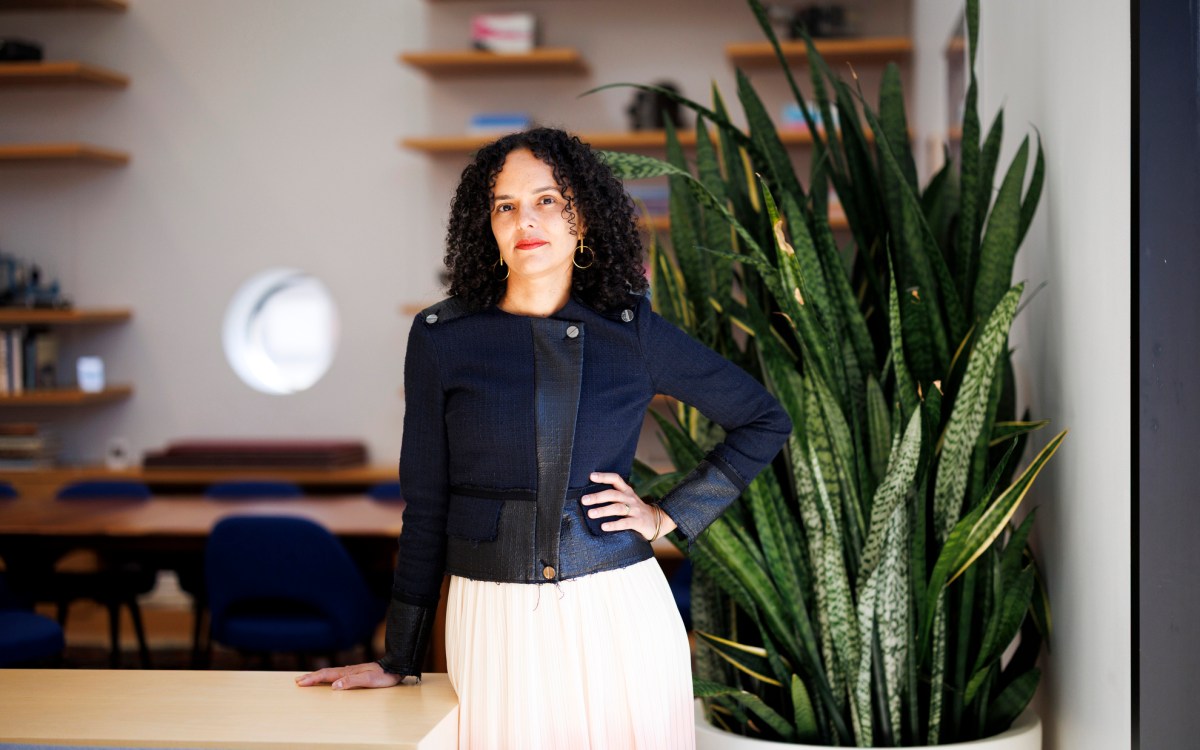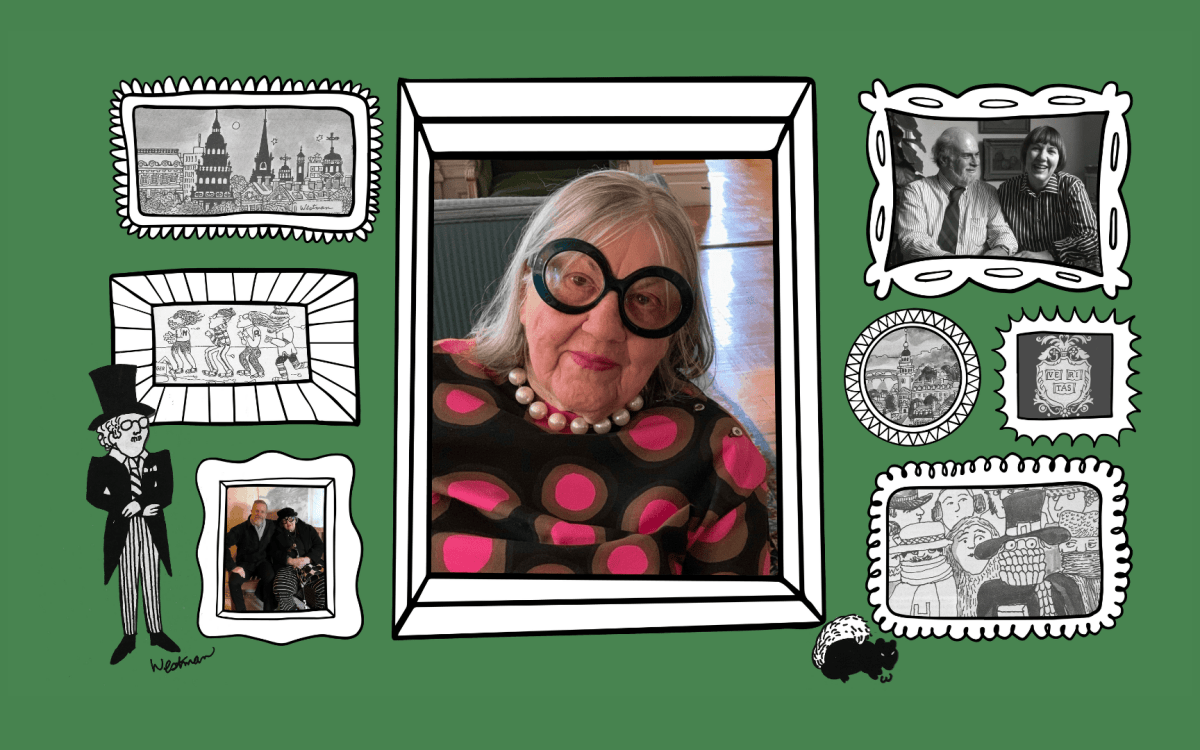Arts & Culture
-

Live fast, die young, inspire Shakespeare
Stephen Greenblatt finds a tragic strain in the life and work of Christopher Marlowe
-

Steve McQueen could lecture you, but he’s got other plans
‘I think the audience needs more, and I feel I need to give more,’ says award-winning filmmaker — presenter of this year’s Norton talks
-

Marking 100 years of Norton Lectures
Panelists reflect on ‘incredible value’ of annual series as ‘megaphone’ for artists and scholars
-

How fashion police have been walking beat for centuries
Houghton Library exhibit highlights the policing of women’s fashion since the 17th century.
-

Seeing what you see
New faculty Cécile Fromont is a visual problem solver
-

Her Cambridge iconography made her a local icon
Before New Yorker covers, Barbara Westman created colorful visions of campus as Gazette’s first staff artist
-
‘For the Bible Tells Me So’
The plight of families who struggle to reconcile their religious beliefs with their children’s sexuality is the focus of the film “For the Bible Tells Me So,” which was screened recently (Feb. 12) in the Thompson Room at the Barker Center for the Humanities.
-
Pauletta Washington honored
There was no debating the glamour of the Harvard Foundation’s black-tie, red-carpet premiere of “The Great Debaters,” starring and directed by Denzel Washington, at the Harvard Film Archive at the Carpenter Center. Close to 200 students, faculty, and staff attended the Dec. 18 premiere, which was followed by a lively question-and-answer session with Washington and his wife, Pauletta, a Juilliard-trained pianist and vocalist.
-
Exhibition shows a lot of soul
Ever wonder what a soul looks like? You have 30 chances to see a picture of one at the Harvard Graduate School of Education’s Gutman Library through Feb. 15. Hundreds more chances if you look at the related book, “Soul” (Reg Vardy Gallery/Satellite Arts, 2007), or if you go to the Web site http://www.drawyoursoul.org.
-
Gamelanathon!
Stepping carefully in their stocking feet, the musicians thread their way among the array of low-lying gongs, drums, and metallophones and lower themselves cross-legged onto the floor. Lifting their padded mallets, they begin to play. The ringing sound of the metal bars, punctuated by the dry slap of the drum and the gong’s shimmering resonance, come together in a gentle, unhurried rhythm, a flowing narrative that seems to capture the miraculous within the pulse of the everyday.
-
Exploring tangled legacy of slavery
Certain adages exist about historical repetition: those who don’t remember the past are doomed to repeat it, for example, or history doesn’t repeat itself but it does rhyme. Walter Johnson doesn’t necessary believe in these old chestnuts, but he does see how the past and the present can illuminate one another in order to provide each greater context, urgency, and understanding.
-
Gamelan rings out at Harvard
The hypnotic, orotund tones of Gamelan, a venerable musical tradition from Indonesia that employs gongs, drums and metallophones, now resonates in University seminar rooms.
-
Cabaret lecture, satirical chansons
Robert Darnton describes the political power of street songs, the “newspapers” of 18th century France, while French mezzo-soprano Helene Delavault sings her heart out.
-
French history is taught, sung in ‘cabaret lecture’
In 18th century Paris, political gossip and courtly intrigue swirled through the city as smoothly and deliciously as well-aged wine. To stay current, most citizens turned not to newspapers but to street songs, popular tunes that were improvised and modified as affairs developed.
-
Chute on graphic narratives — they’re not just comic books anymore
The title of Hillary Chute’s Nov. 29 lecture, “Out of the Gutter: Contemporary Graphic Novels by Women,” has a double meaning. It refers to the elevation of graphic narratives — comics — from the lowest, most disreputable level of artistic expression to a form worthy of New York Times best-sellerdom, literary prizes, and academic attention.
-
‘The diverse ways history can be written’
Relocating to a foreign city for a new job can be stressful in the most congenial circumstances. Trying to depart your home country in the middle of a Communist coup? As Serhii Plokhii, Hrushevs’kyi Professor of Ukrainian History in the Faculty of Arts and Sciences, can tell you — that’s downright complicated.
-
Scholar uses Singer sewing machine to parse cultural, economic development
Harvard historian Andrew D. Gordon ’74, Ph.D. ’81 specializes in modern Japan and has written or edited a handful of breakthrough books on big labor, big steel, and big management.
-
Africans, ‘Africanness,’ and the Soviets
It’s no secret that a century and a half after the Civil War, the United States still struggles to come to terms with the legacy of African slavery.
-
A.R.T. announces ‘Family Friday’ for ‘No Child …’ premiere
The American Repertory Theatre (A.R.T.) is offering a special discounted ticket price for its Nov. 23 premiere of “No Child … ” — the Obie Award-winning one-woman show by Nilaja Sun. Tickets for the “Family Friday” performance are $25 for each member of a family with a young adult under 21 years of age. (“No Child …” contains strong language and is suitable for children 15 and up.)
-
Houghton exhibit features ‘luminous’ historian
While Edward Gibbon was publishing his six-volume opus, “Decline and Fall of the Roman Empire,” a large portion of Britain’s empire was declaring its independence and fighting to break free of the mother country.
-
Scholar looks at abiding interest in the ‘Great American Novel’
Literary critics tend to discredit the concept of a “Great American Novel” as nothing more than media hype — an arbitrary appellation that has more to do with pipe dreams than merit. And yet, what would-be author hasn’t imagined, when putting pen to paper, what it would feel like to be hailed as the greatest chronicler of the age?
-
Digging history in Harvard Yard
It was crowded in the hole in Harvard Yard, with sophomore Reyzl Geselowitz and freshman Alison Liewen crouching in the square pit, elbow to elbow and more than a yard deep in Harvard’s dark earth.
-
Borderless America
Sometimes what we call something changes the way we see it. Steven Hahn wants to call the groups of escaped slaves who found refuge in the northern United States prior to the Civil War “maroon communities.”
-
The hidden resources of ‘the extended piano’
Brian Kane’s composition “Another Cascando” sounds a bit like barking dogs at a construction site; Johannes Kreidler’s “Piano Piece #5” is reminiscent of distant artillery fire; and Hans Tutschku’s “Zellen – Linien” seems to include the sharp, high-pitched sounds of breaking glass.
-
Freshmen strut fantasy runway
The third annual Freshman Costume Catwalk brought out the precocious brilliance of this generation of first-year students. Five hundred dazzling freshmen gathered in Annenberg Hall to get a chance to strut their costumed stuff on the runway.
-
Kennedy Center to showcase A.R.T. production
The American Repertory Theatre (A.R.T.) will join nine other theater groups to present at the 10th New Visions/New Voices festival this spring (April 25-27) at the John F. Kennedy Center for the Performing Arts in Washington, D.C.
-
‘When I wrote a play, I found that I lost myself’
A black comedy from the early 1960s with a title too long to fit the average marquee may seem an odd choice for the New College Theatre’s first production, but once you’ve heard the story behind the play, it makes perfect sense.
-
Former trio reunited and it sounds so good
Peter Gomes wasn’t stingy with his superlatives when he introduced the trio of musicians about to perform at the Memorial Church on the evening of Oct. 30.
-
Tools for ‘navigating childhood’
The fairy tales of Hans Christian Andersen have enchanted children the world over for more than two centuries with their verbal sorcery and expressive intensity. Now their iconic power has drawn the attention of a Harvard professor, who hopes to broaden our understanding of how those eye-widening fairy tales expand the imaginations of children.
-
Rehding finds ‘monumental’ works key to German political history
In December 1989, a few weeks after the reunification of Germany, Leonard Bernstein ’39 raised his baton above the ruins of the Berlin Wall and conducted a special arrangement of Beethoven’s Ninth Symphony. The central statement of the work — “all men will be brothers” — captured the sentiment of those who saw a brighter future for the nation.
-
Taxonomist Carl Linnaeus on show at HMNH
Carl Linnaeus believed that the fruit of the Tree of Knowledge was not an apple but a banana. He came to this conclusion in 1737, while studying plant specimens at Hartecamp, the estate of George Clifford, a wealthy Dutch banker and director of the Dutch East India Company. Clifford collected exotic plants from around the world and had succeeded in getting a banana plant to flower and bear fruit in his greenhouse. Linnaeus’ belief in the theological significance of the banana is enshrined in the name he gave it: Musa paradisiaca.
-
Tale of John Harvard’s surviving book
This November, Harvard University will mark the 400th anniversary of the birth of John Harvard, not the institution’s founder as he is sometimes credited, but rather its first major benefactor. Such a noteworthy anniversary warrants reflection, although, unfortunately, a great many details about both the history of John Harvard and the legacy of his library are lost to time.
-
Darnton looks at the ‘art and politics of libel’ in 18th century France
Government censors in pre-Revolutionary France were so hypervigilant that under their watchful eyes no one with anything significant to say dared publish their works in their own country. The solution was to publish abroad and smuggle the contraband books into France where they were soon snapped up by eager readers.
-
It takes 200 (or more) to tango
Barefoot and dressed with thrift-shop elegance in a floor-length, taffeta gown with fingerless gloves and a discus-shaped hat, Marta Elena Savigliano read from her paper “Wallflowers and Femmes Fatales: Dancing Gender and Politics at the Milongas” with a tinkling Argentine accent and an air of fey imperturbability.
-
Washington Allston, a name to remember
When you graduate from a University that counts dozens of U.S. presidents and Supreme Court justices — and hundreds of distinguished scholars, scientists, and Nobel Prize winners — among its alumni, it is easy, even for the most accomplished and talented, to slip through the cracks into obscurity. One such alumnus whose reputation has fallen victim to time and fashion is the painter Washington Allston, perhaps the most famous Harvard graduate you’ve never heard of.
-
Taxonomist Carl Linnaeus on show at HMNH
Carl Linnaeus believed that the fruit of the Tree of Knowledge was not an apple but a banana. He came to this conclusion in 1737, while studying plant specimens at Hartecamp, the estate of George Clifford, a wealthy Dutch banker and director of the Dutch East India Company. Clifford collected exotic plants from around the world and had succeeded in getting a banana plant to flower and bear fruit in his greenhouse. Linnaeus’ belief in the theological significance of the banana is enshrined in the name he gave it: Musa paradisiaca.


